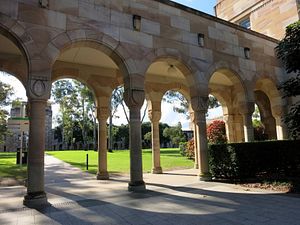The Australian government is becoming increasingly concerned about the influence of the Chinese government on Australian university campuses. Last week the attorney-general announced that there would be an investigation into whether agreements between Australian tertiary education institutions and Beijing-funded Confucius Institutes are in violation of Australian’s new anti-foreign interference laws.
The Foreign Influence Transparency Scheme was created in December last year. It was designed to create a publicly accessible register detailing all persons or organizations operating in Australia that act on behalf of a foreign government, a foreign political organization, or an organization related to a foreign government entity. However, none of the 14 Confucius Institutes currently operating in Australia submitted themselves to the register. Meanwhile, entities such as the United States Study Center, funded by the U.S Department of State and operating out of the University of Sydney, are on the register. With the Confucius Institutes an arm of China’s Ministry of Education, their absence is conspicuous.
The move to pay closer attention to the operations of Confucius Institutes in Australian universities coincided with an incident at the University of Queensland last week in which students demonstrating their support of the ongoing protests in Hong Kong clashed with students from mainland China. The pro-Hong Kong students claimed that they were punched, insulted, and had their placards ripped up by students from mainland China.
The situation escalated into a diplomatic incident when the Chinese consulate-general in Brisbane praised the actions of the mainland Chinese students as “acts of patriotism.” Australian Foreign Minister,Marise Payne then issued a statement that warned foreign diplomats to respect Australia’s rights of free speech and right to protest, even over sensitive issues. Payne stated that “The government would be particularly concerned if any foreign diplomatic mission were to act in ways that could undermine such rights, including by encouraging disruptive or potentially violent behavior.”
This incident will add further fuel to the debate in Australia about whether the country’s universities are becoming too reliant on revenue from Chinese students, and whether this may influence their actions. Education has become Australia’s fourth largest export, and in 2018 255,896 Chinese students studied in Australia, making up almost a third of the total international student numbers (although students are locally based, their fees and living expenses are considered export revenue). There remains an ever-present fear that annoying the Chinese government in any way may lead to Beijing taking steps to reduce the number of students coming to study in Australia.
This leads to concerns that the sheer weight of this phenomenon could induce university administrators to seek to curb academic freedom and the processes of critical inquiry around subjects concerning China. Other concerns are whether this will create a culture of self-censorship by academics and students, or indeed lead to direct action by Chinese students keen to silence views critical of the Chinese government (although treating all Chinese students as a homogenous group with a fervent devotion to the Chinese Communist Party is also unhelpful).
However, the situation for Australian universities is compounded by the presence of organizations like the Confucius Institute that do demand political loyalty to the Chinese Communist Party (CCP) in order to gain employment. Confucius Institutes are widely seen as more than just centers teaching Mandarin or Chinese culture, but a key arm of the CCP’s propaganda operations abroad.
This is what is most concerning to the Australian government, especially in light of recent revelations about the contracts many Australian universities have signed with Hanban (the Institute’s Beijing headquarters) that may give Beijing direction over what these contracts describe as “teaching quality” — a highly flexible phrase that could create an insistence on teaching materials, or provide parameters around class discussion.
Although the Foreign Influence Transparency Scheme will be used to determine that all countries’ foreign influence activities in Australia are “open, lawful and transparent,” the impetus for the scheme was created by a need to monitor and understand Chinese activity in the country. Australia has become the vanguard country for much of the pushback against Beijing’s increased reach, exposing local CCP-linked operators, taking a hard line against Huawei’s participation in Australia’s communications network, and making sure its Pacific neighbors did likewise.
The investigation launched by the attorney-general into the activities of Confucius Institutes in Australian universities will likely be an extensive one. As a result, university administrators may find themselves part of a wider struggle over how liberal democracies counter the emergence of a great power that is not only not like them, but has a far greater interaction and interdependence with them than the previous non-liberal-democratic great power, the Soviet Union. Due to this it remains important that universities continue to be engaged with China, but do so with a keen awareness of the nature of the regime in Beijing, and how its incessant need to control information clashes with the core purpose of a university’s educational mission.

































